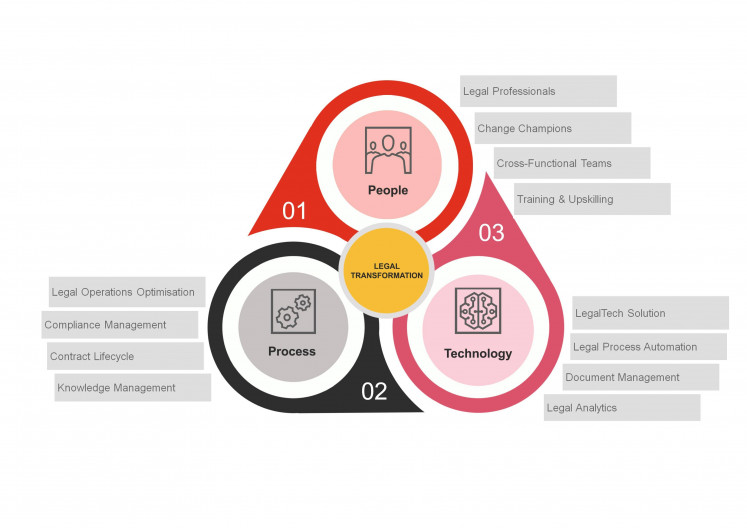Popular Reads
Top Results
Can't find what you're looking for?
View all search resultsPopular Reads
Top Results
Can't find what you're looking for?
View all search resultsThe rise of legal innovation: Building future-ready legal departments
Change text size
Gift Premium Articles
to Anyone
I
n today’s tech-driven business landscape, legal departments are facing increasing challenges in contributing their value to organisations. Conventional processes and paper-based documentation can be time-consuming and prone to errors, as in-house counsels spend considerable time drafting contracts, managing case files, monitoring licensing compliance and conducting research using basic tools like email and word processors.
Increasingly complex and data-intensive work requires agility and efficiency for legal operations, yet these qualities are often lacking, which leads to bottlenecks. As businesses undergo digital transformation, legal departments sometimes find themselves less prioritised. This oversight means legal departments are not always integrated into broader strategic digital transformation efforts in businesses, restricting their ability to contribute valuable insights aligned with business objectives.
Based on PwC’s NewLaw survey in 2023, legal departments in the Asia-Pacific (APAC) region encounter numerous barriers to modernisation. These barriers include limited access to emerging technological solutions, hindering the ability to operate efficiently. This is also influenced by the still limited legal infrastructure that can support in-house counsels in addressing complex legal challenges. For instance, the approach to legal e-discovery remains conventional, and many tasks related to extracting information and data are still performed manually, highlighting a reliance on human intervention rather than leveraging automated systems or advanced technologies. This manual approach can lead to inefficiencies and a higher likelihood of errors.
In Indonesia, legal departments grapple with increasing regulations driven by dynamic political and industrial changes. Notably, the introduction of the Indonesian omnibus law has led to numerous subsidiary regulations that legal departments must interpret and comply with. From the governance perspective, this challenge is also burdensome due to the largely manual paperwork still used in legal operations. Additionally, they must navigate compliance in new areas in this tech-driven landscape, such as personal data protection and artificial intelligence (AI).
Compounding these issues is a widespread unfamiliarity with legal technology (LegalTech) solutions. In 2023, PwC’s NewLaw survey found that 77% of legal professionals in the APAC region lacked sufficient knowledge or access to these innovative tools. LegalTech solutions offer capabilities such as automated contract analysis, real-time compliance monitoring and advanced legal research powered by AI, significantly reducing manual workloads and increasing accuracy. This knowledge gap also indicates a need for in-house counsels to engage in continuous learning and to be more collaborative with other departments within the organisation to effectively capitalise on the potential use of in-house LegalTech solutions.
As a result, legal departments face delayed response times, increased operational costs and missed business opportunities. The inability to adapt quickly to market changes or leverage data effectively not only affects the timeliness of legal responses but also escalates costs due to inefficiencies. Legal departments that fail to modernise risk are missing out on strategic opportunities that could drive business growth, emphasising the need for adopting innovative legal technologies and practices.
Furthermore, these challenges can lead to significant compliance risks. The growing complexity of these rules demands that legal departments meticulously track compliance status. Missing deadlines can result in penalties, financial losses and reputational harm. In response to these challenges, legal departments are experiencing a significant shift in momentum, driven by the recent surge of advanced technologies and the transformative impact of Generative AI (GenAI).
These innovations offer newfound capabilities to automate routine tasks, enhance decision-making and improve efficiency for legal departments.
Since 2024, PwC has integrated ChatPwC, a GenAI developed by PwC to assist day-to-day work. In many use cases, ChatPwC has successfully contributed to streamlining a more efficient workflow. This integration of GenAI marks a generational leap forward in terms of insights, research and analysis.
Reflecting on PwC’s NewLaw team’s successful legal innovation scenarios, a clear path for building future-ready legal departments involves a three-pillar legal transformation approach centered on people, process and technology. Empowering people involves upskilling legal professionals to utilise new tools and technologies effectively, fostering a culture of innovation and adaptability. Process transformation requires a thorough review and optimisation of workflows to eliminate ‘pain points’ and enhance productivity.
Finally, integrating advanced technology necessitates investing in state-of-the-art software and platforms that support seamless process execution to enhance legal departments’ capabilities.
Transforming legal departments should be prioritised by companies. In today's rapidly evolving business landscape, legal departments are at the forefront of this evolution, playing a critical role in managing the risks associated with these transformative processes. Legal departments are now recognised as value generators, not merely risk managers.
Both the head of legal departments and the C-suite should increasingly be aware of the pressing need for change. Legal departments must embrace the opportunity, while the C-suite should make strategic decisions and investments in people, processes and technology.
The ideas expressed here do not represent The Jakarta Post’s views and policies.













